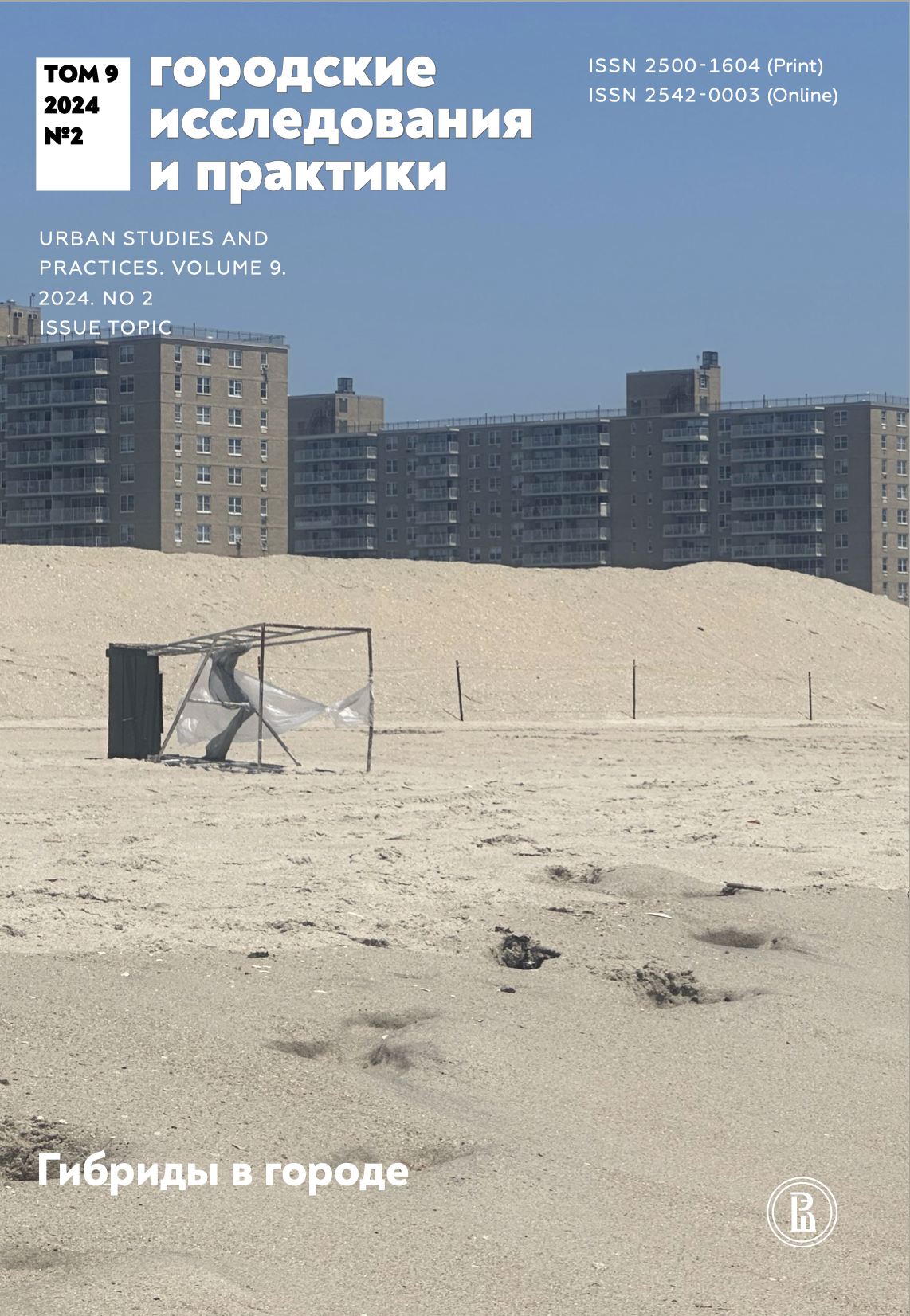Urban Scientist: Who Brings Nature into Our Home?
Abstract
This article analyzes the relationships between science and the city, where science acts as an operator of nature. Focusing on public scientific communication, the study explores the role of the scientist in these relationships. A thesis is proposed that in the communication about the natural and urban (cultural), the scientist holds an ambivalent position. On the one hand, the scientist acts as a “representative” of nature—speaking on behalf of facts and having access to objective and naturalized knowledge. Being an urban resident, the scientist participates in the representation of the natural world and influences what nature is for the city. On the other hand, the scientist is involved in creating the innovative, technical nature of the city itself, implying the use of technology, devices, interfaces, laboratories, and recording systems. The city, as a place of innovation, solidifies the urban identity of the scientist, creating a gap between his aspiration for nature, which is mandatory in the public perceptions of science, and his technocratic embeddedness. Analyzing this gap, the author turns to the historical component of scientific and urban life, using the ideas of the sociologist Bruno Latour and several other authors. The study concludes with a thesis on the importance of reflexive change in the regimes of the natural–urban continuum, which can benefit the relationships between nature, the city, technology, science, and humans.
Downloads
References
Бауэр М., Белл Э., Борхельт Р. (2018). Пособие по общественным связям в науке и технологиях. М.: Альпина нон-фикшн.
Берг Т. (2023). Театр мира. История картографии. М.: Ад Маргинем.
Блинов Е., Савченко И. (2019). Бруно Латур против климатического скептицизма: миссия ученого и кризис политических учреждений // Философский журнал. № 4. С. 70–84.
Вахштайн В. (2014). Пересборка города: между языком и пространством // Социология власти. № 2. С. 9–38.
Вилейкис А., Ханова П. (2021). Город — гиперобъект. Введение // Городские исследования и практики. № 4. С. 7–16.
Глейзер Э. (2022). Живучесть городов // Городские исследования и практики. № 2. С. 129–155.
Делез Ж., Гваттари Ф. (2010). Тысяча плато: Капитализм и шизофрения. Екатеринбург: У-Фактория.
Делёз Ж., Гваттари Ф. (1998). Что такое философия? М.: Институт экспериментальной социологии; СПб.: Алетейя.
Джекобс Д. (2011). Смерть и жизнь больших американских городов. М.: Новое издательство.
Заласевич Я. (2022). Земля после нас: Что расскажут камни о наследии человека? СПб: Издательство Европейского университета в Санкт-Петербурге.
Замятин Д. (2022). Онтологии картографии: географическое воображение и планетарность // Логос. № 6. С. 183–202.
Кант И. (1994). О причинах землетрясений // Собр. соч.: в 8 т. М.: ЧОРО. Т. 1. С. 333–342.
Латур Б. (2019). Где приземлиться? Опыт политической ориентации. СПб.: Издательство Европейского университета в Санкт-Петербурге.
Латур Б. (2012). Политика объяснения: альтернатива // Социология власти. № 8. С. 113–143.
Латур Б. (2006). Нового времени не было: эссе по симметричной антропологии. СПб.: Издательство Европейского университета в Санкт-Петербурге.
Латур Б. (2020). Пересборка социального. Введение в акторно-сетевую теорию. М.: Издательский дом Высшей школы экономики.
Латур Б. (2018). Политики природы. Как привить наукам демократию. М.: Ад Маргинем.
Ло Дж. (2015). После метода: беспорядок и социальная наука. М.: Издательство Института Гайдара.
Мортон Т. (2022). Род человеческий. Солидарность с нечеловеческим народом. М.: Издательство Института Гайдара.
Патимова П. (2021). Город. Мифы, природа и насилие // Городские исследования и практики. № 4. С. 17–25.
Паяль А. (2019). Переосмысление досуговых цифровых сетей с помощью глобальных городов: метафорический взгляд // Логос. № 1. С. 85–129.
Петров М. (2007). Образы науки и ученого в общественном сознании // Epistemology & Philosophy of Science. № 3. С. 222–237.
Писарев А. (2022). Картографируя новую материальность: навигационные установки и картины мира // Логос. № 6. С. 159–182.
Писарев А., Гавриленко С. (2020). В поисках ускользающего объекта: наука и ее история // Логос. № 1. С. 1–28.
Подорога В. (2022). Возвышенное. После падения. Краткая история общего чувства. М.: Новое литературное обозрение.
Розин В. (2009). О философских предпосылках античной наук // Epistemology & Philosophy of Science. № 2. С. 13–31.
Секигути Р. (2023). Нагори. Тоска по уходящему сезону. М.: Ад Маргинем.
Такер Ю. (2017). В пыли этой планеты. Пермь: Гиле Пресс.
Тума Л. (2021). Касание ландшафта и размещенная магия // Syg.ma. Режим доступа: https://syg.ma/@geograf-smirnoff/liusi-tuma-kasaniie-landshafta-i-razmieshchionnaia-maghiia (дата обращения: 26.03.2024).
Хайдеггер М. (1993). Вопрос о технике // Хайдеггер М. Время и бытие: Статьи и выступления. М.: Республика. С. 221–238.
Харауэй Д. (2021). Оставаясь со смутой: Заводить сородичей в хтулуцене. Пермь: Гиле Пресс.
Хархордин О. (2006). Предисловие редактора // Латур Б. Нового времени не было: эссе по симметричной антропологии. СПб: Издательство Европейского университета в Санкт-Петербурге. С. 5–56.
Хестанов Р., Сувалко А. (2022). Кто принимает решения в умном городе // Городские исследования и практики. № 1. С. 7–21.
Хуэй Ю. (2023). Вопрос о технике в Китае. Эссе о космотехнике. М.: Ад Маргинем.
Шиповалова Л. (2018). Научная революция — разрыв с прошлым или его возобновление? О двусмысленном ответе современной историографии // Вестник ТГУ. Философия. Социология. Политология. № 45. С. 47–57.
Шиповалова Л. (2021). Судьба визуализаций в публичной научной коммуникации: между действием и представлением // ΠΡΑΞΗMΑ. Journal of Visual Semiotics. № 4. С. 273–292.
Latour B. (2017). Facing Gaia: Eight lectures on the new climatic regime. Hoboken: John Wiley & Sons.
Schuster J. (2013). Descartes-Agonistes: Physico-mathematics, Method & Corpuscular Mechanism 1618–1633. London: Springer.
Serres M. (1995). The Natural Contract. Ann Arbor, MI: University of Michigan Press.
Simondon G. (2005). L'individuation à la lumière des notions de forme et d'information. Grenoble: Editions Jérôme Millon.

